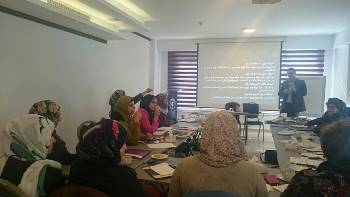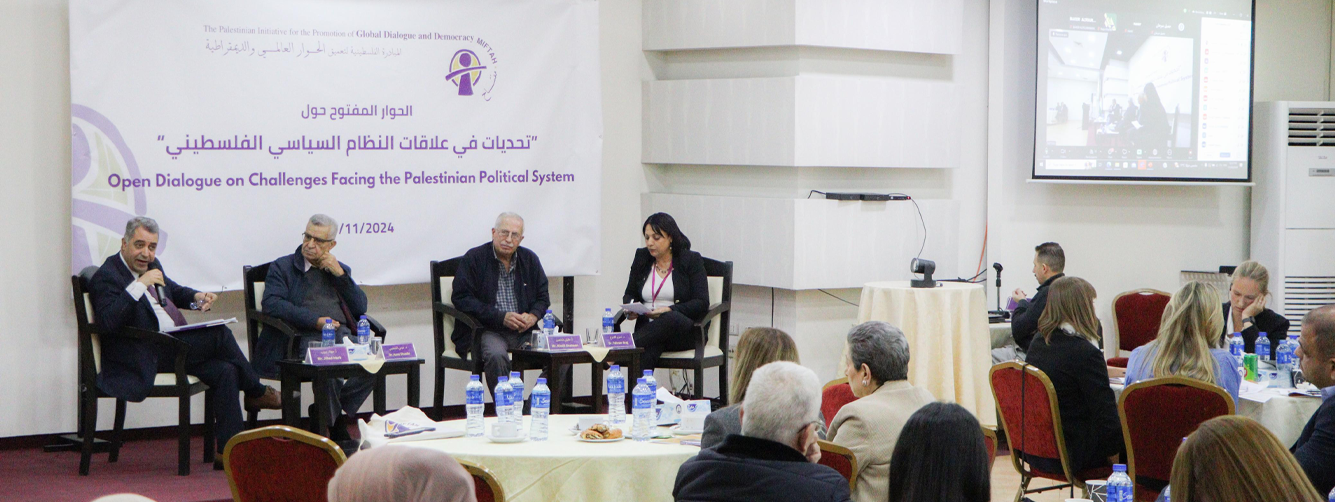
Ramallah: MIFTAH recently completed training workshops over the course of four days for members of the women’s shadow committee for the national reconciliation committees, held concomitantly in Ramallah and Gaza. The training revolved around “conflict management skills, building civic peace and the art of negotiating and debate”.
MIFTAH project director Najwa Yaghi said the trainings were a continuation of MIFTAH’s efforts within the framework of promoting women’s political and social participation in achieving national reconciliation and pushing for an end to the political division. MIFTAH formed a women’s shadow committee comprised of members of the Secretariat of the Women’s Coalition for UN Resolution 1325 in addition to other women political and social leaders. Their goal was to devise a women’s agenda to be included in the discussions of the official reconciliation committees and to push for a consensus on issues that encourage national reconciliation. To this end, the shadow committee was given the necessary skills and information to carry out its tasks.
Training subjects
A total of 29 women participated in the training in Ramallah and Gaza and received skills in methods of conflict management and building civil peace through an introduction to concepts of conflict, its stages, types and sources, tools for conflict analysis and understanding the patterns and mechanisms for dealing with it such as mediation, arbitration and negotiation. The training program followed a participatory methodology whereby the participants were actively involved. Furthermore, some of the exercises helped in creating a better space for creativity and flexibility.
According to the trainers, the information and skills the participants received helped them to analyze conflicts and to find realistic and applicable solutions in line with the intervention. They were introduced to several techniques for conflict resolution such as mediation, arbitration, negotiation and dialogue in addition to the tools for each technique and communication and listening skills. This gave them a deeper understanding of the conflict and its reasons vis-à-vis the controversial issues involved and they learned the importance of starting from a win-win basis during the intervention. .
Recommendations
The participants all recommended that training continues, especially those related to conflict-management skills. They expressed their desire to learn more about the internal Palestinian division and to follow up with the unofficial sessions on it. They said it was imperative to be part of the negotiating process (both internationally and regionally) and in the preparation of a work agenda according to which the shadow committee can operate. They also recommended that the monitoring shadow committee is revived so it could monitor the course of reconciliation negotiations and detect the gaps in the discussions and negotiations and understand their reasons. The committee would seek out solutions to overcome these gaps in the interest of national unity. They noted that the shadow committee needs a preparatory phase during which it can develop its vision, approaches and role. They said their committee should also communicate with the reconciliation committees so it could have more of a presence in them.
The trainers recommended the need to determine the goals and vision of the committee so they could formulate a work plan and distribute the roles within it. They also said the shadow committee needed to be divided into a number of specialized committees in the various fields such as legal, social, and media committees. This way, the members could work in a group suitable for their own expertise and experiences. The trainers continued that conditions and criteria must be set down for joining the committee in addition to formulating a code of conduct for the members to ensure their efficacy and their commitment to the goal for which it was established. They recommended meetings with decision-makers in official institutions, especially over controversial issues pertaining to the women’s, security, economic and social agendas. Finally, they said awareness meetings should be increased for members of the group on the various contentious issues between the two sides of the divide.








